Tax
This week, Rep. Lloyd Smucker (R-PA), along with 80 of his House colleagues, introduced the Main Street Certainty Act. This bill would make permanent Sec. 199A of the Internal Revenue Code which allows pass-through businesses a 20 percent tax deduction. This provision, enacted by the Tax Cuts and Jobs Act, is set to expire after 2025. The bill is identical to S. 1706 sponsored by Sen. Steve Daines (R-MT). A letter of support signed by over 160 trade associations, including ABMA, may be found here: joined our letter
Workforce
On July 19, the Senate Small Business and Entrepreneurship Committee marked up several bills, including S. 936—the Supporting Small Business and Career and Technical Education Act. This bipartisan bill led by Sen. Roger Marshall (R-KS) and cosponsored by Senators Ben Cardin (D-MD) and Chris Koons (D-DE) directs Small Business Development Centers (SBDC) and Women Business Centers (WBC) to assist small businesses in hiring CTE program graduates. It also affords CTE graduates access to SBDC and WBC resources that are useful for starting a small business. The companion legislation in the House is H.R. 1730, also a bipartisan bill led by Rep. Roger Williams (R-TX) and cosponsored by a balanced mix of House Democrats and Republicans.
Also on the workforce front, Senate Career and Technical Education (CTE) Caucus co-chairs Tammy Baldwin (D-WI), Todd Young (R-IN), and Tim Kaine (D-VA) earlier this month introduced S. 2290–the Data for American Jobs Act of 2023, bipartisan legislation to support career and technical education and expand pathways to good-paying jobs. The legislation ensures that federal education data and research incorporate CTE to help improve states’ career readiness programs, meet the needs of the economy and expand the skilled workforce.
Specifically, this bill directs the Department of Education’s Institute for Education Sciences to incorporate CTE into its research and data collection agenda and empowers states to better use data to inform education and workforce development policy. Areas of data collection would be the following:
- Research relevant to career and technical education including, research on which methods are most effective for CTE learners;
- Sharing of CTE research to inform development of effective curricula for students and faculty;
- Data collection on the CTE teacher workforce to address training, recruitment, and retention; and
- Examining the workforce and labor market outcomes to help CTE programs better meet the needs of local employers.
The legislation would also support state efforts to more effectively use education and workforce data to inform education and workforce development policy. The bill was referred to the Senate Health, Education, Labor and Pensions Committee.
Proposed Rule on Personal Protective Equipment (PPE)
On Wednesday, the Occupational Safety and Health Administration (OSHA) issued a notice of proposed rulemaking to revise its PPE standard in construction to explicitly require that the equipment fit properly. In its background document supporting the rulemaking, OSHA cites that ill-fitting PPE may not protect an employee at all, and in other cases, it may present additional hazards to the employee, and to employees who work around them. For example, sleeves of protective clothing that are too long or gloves that do not fit properly may make it difficult to use tools or control equipment, putting other workers at risk of exposure to hazards. The legs of protective garments that are too long could cause tripping hazards and impact others working near the worker with improperly fitting PPE. OSHA asserts that the issue of improperly fitting PPE is particularly important for smaller construction workers, including some women, who may not be able to use standard-size PPE. Fit problems can also affect larger workers, especially with regard to the size of certain harnesses. ABMA is reaching out to OSHA to ascertain whether this proposed rule would extend to the LBM sector. OSHA is accepting comments on the proposal through September 18.




